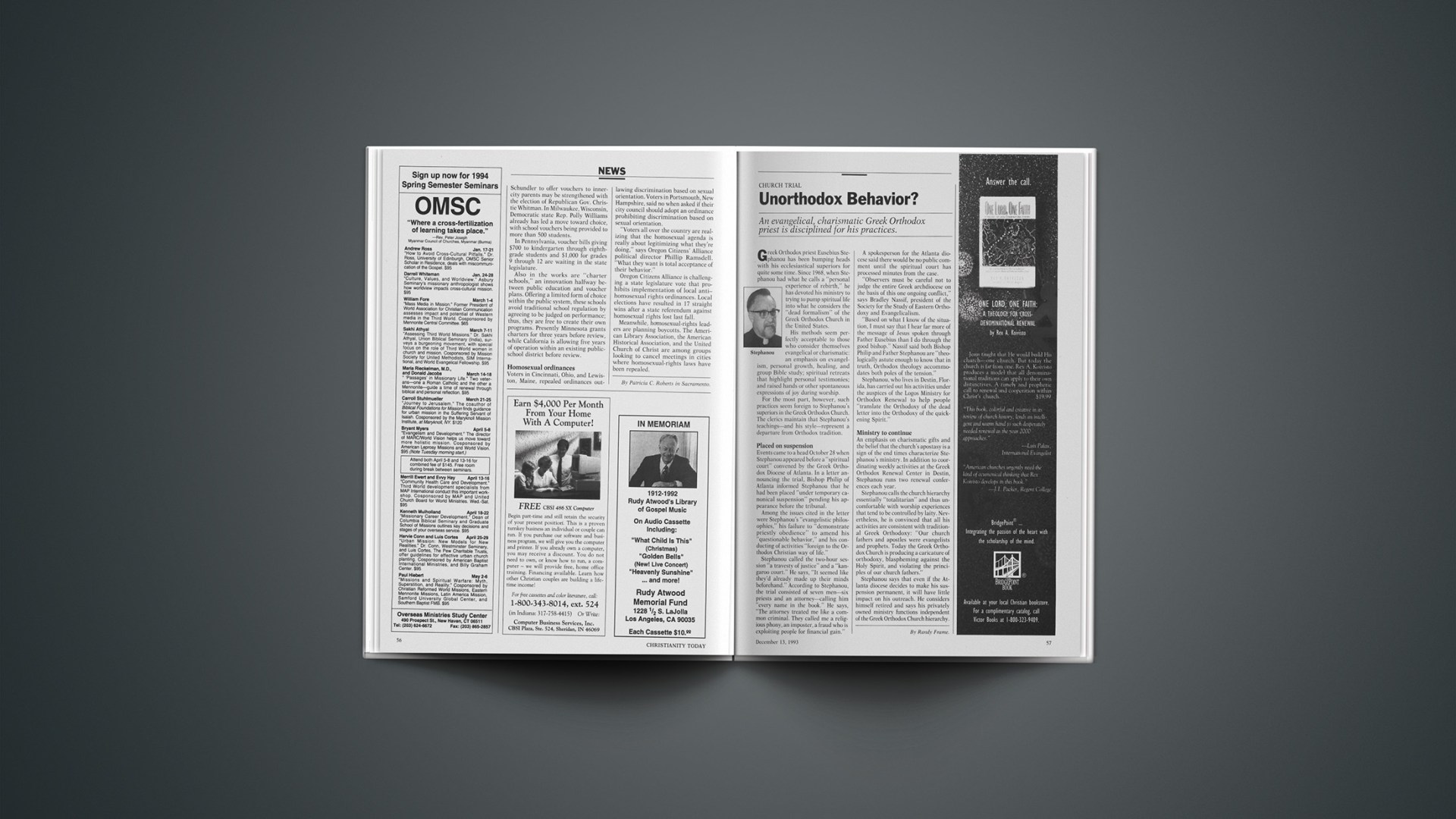An evangelical, charismatic Greek Orthodox priest is disciplined for his practices.
Greek Orthodox priest Eusebius Stephanou has been bumping heads with his ecclesiastical superiors for quite some time. Since 1968, when Stephanou had what he calls a “personal experience of rebirth, he has devoted his ministry to trying to pump spiritual life into what he considers the “dead formalism” of the Greek Orthodox Church in the United States.
His methods seem perfectly acceptable to those who consider themselves evangelical or charismatic: an emphasis on evangelism, personal growth, healing, and group Bible study; spiritual retreats that highlight personal testimonies; and raised hands or other spontaneous expressions of joy during worship.
For the most part, however, such practices seem foreign to Stephanou’s superiors in the Greek Orthodox Church. The clerics maintain that Stephanou’s teachings—and his style—represent a departure from Orthodox tradition.
Placed on suspension
Events came to a head October 28 when Stephanou appeared before a “spiritual court” convened by the Greek Orthodox Diocese of Atlanta. In a letter announcing the trial, Bishop Philip of Atlanta informed Stephanou that he had been placed “under temporary canonical suspension” pending his appearance before the tribunal.
Among the issues cited in the letter were Stephanou’s “evangelistic philosophies,” his failure to “demonstrate priestly obedience” to amend his “questionable behavior,” and his conducting of activities “foreign to the Orthodox Christian way of life.”
Stephanou called the two-hour session “a travesty of justice” and a “kangaroo court.” He says, “It seemed like they’d already made up their minds beforehand.” According to Stephanou, the trial consisted of seven men—six priests and an attorney—calling him “every name in the book.” He says, “The attorney treated me like a common criminal. They called me a religious phony, an imposter, a fraud who is exploiting people for financial gain.”
A spokesperson for the Atlanta diocese said there would be no public comment until the spiritual court has processed minutes from the case.
“Observers must be careful not to judge the entire Greek archdiocese on the basis of this one ongoing conflict,” says Bradley Nassif, president of the Society for the Study of Eastern Orthodoxy and Evangelicalism.
“Based on what I know of the situation, I must say that I hear far more of the message of Jesus spoken through Father Eusebius than I do through the good bishop.” Nassif said both Bishop Philip and Father Stephanou are “theologically astute enough to know that in truth, Orthodox theology accommodates both poles of the tension.”
Stephanou, who lives in Destin, Florida, has carried out his activities under the auspices of the Logos Ministry for Orthodox Renewal to help people “translate the Orthodoxy of the dead letter into the Orthodoxy of the quickening Spirit.”
Ministry to continue
An emphasis on charismatic gifts and the belief that the church’s apostasy is a sign of the end times characterize Stephanou’s ministry. In addition to coordinating weekly activities at the Greek Orthodox Renewal Center in Destin, Stephanou runs two renewal conferences each year.
Stephanou calls the church hierarchy essentially “totalitarian” and thus uncomfortable with worship experiences that tend to be controlled by laity. Nevertheless, he is convinced that all his activities are consistent with traditional Greek Orthodoxy; “Our church fathers and apostles were evangelists and prophets. Today the Greek Orthodox Church is producing a caricature of orthodoxy, blaspheming against the Holy Spirit, and violating the principles of our church fathers.”
Stephanou says that even if the Atlanta diocese decides to make his suspension permanent, it will have little impact on his outreach. He considers himself retired and says his privately owned ministry functions independent of the Greek Orthodox Church hierarchy.
By Randy Frame.










